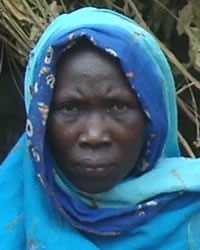Jumjum, Berin in Sudan

Photo Source:
Anonymous
|
Send Joshua Project a map of this people group.
|
| People Name: | Jumjum, Berin |
| Country: | Sudan |
| 10/40 Window: | Yes |
| Population: | 100,000 |
| World Population: | 106,500 |
| Primary Language: | Jumjum |
| Primary Religion: | Islam |
| Christian Adherents: | 2.00 % |
| Evangelicals: | 0.80 % |
| Scripture: | Portions |
| Ministry Resources: | Yes |
| Jesus Film: | No |
| Audio Recordings: | Yes |
| People Cluster: | Nilotic |
| Affinity Bloc: | Sub-Saharan Peoples |
| Progress Level: |
|
Introduction / History
The Jumjum people inhabit the Fung region of the Blue Nile Province in eastern Sudan. They are part of the Nilotic ethnic groups, characterized by their connection to the upper Nile Valley. The area is a mix of flatlands and rocky hills, with most Jumjum settlements located at the foot of these hills. Historically, they have faced invasions from neighboring Dinka, Nuer, and Shilluk groups, who often raided their region for slaves. Geographically and linguistically, the Jumjum are closely related to the Burun people, and some consider the two groups as a single entity.
What Are Their Lives Like?
The Jumjum lead agrarian and pastoral lives. Both men and women engage in farming millet, sesame, and beans, while herding livestock—cattle, goats and sheep—is primarily the responsibility of men and boys. Hunting, fishing and gathering wild fruits also supplement their diet.
Villages consist of spaced homesteads, each containing huts for living, granaries and animal shelters. Huts are traditionally round, with mud walls and thatched grass roofs. Each wife has a hut where she raises children and manages household activities.
A "rain chief" serves as both the political and religious leader of the village. He symbolizes authority through heirloom spears, drums, and other cultural insignia. His hut is viewed as a sanctuary, and his leadership is integral to community rituals.
Marriage is arranged by parents, often during childhood. Before marrying, a man must perform bride service by working on the bride's family land and caring for their livestock. A bride price, typically including cattle, goats and other items is also customary. Wealthy men may practice polygamy, maintaining multiple wives.
Education remains limited, with regional schools offering basic instruction in Arabic at lower levels and English at higher levels. Access to medical care is scarce, with traditional healers and village chiefs addressing most health concerns.
Burial traditions involve interring the deceased with symbolic items such as spears and hoes, followed by offerings on the grave to honor their departure.
What Are Their Beliefs?
The Jumjum practice animism, believing spirits inhabit non-human objects. Their supreme deity, Dyong, is depicted as residing in the sky, seated on a horse. Rainmaking plays a significant role in their spirituality, with the rain chief conducting rituals involving "rain stones" and animal sacrifices to invoke rainfall. Witchcraft and divination are also prevalent among the Jumjum.
What Are Their Needs?
The Jumjum face significant challenges that require attention:
They need expanded access to schools, improved literacy and materials in their own language.
They need greater availability of medical facilities and services to reduce reliance on traditional healers.
They need clean water, adequate roads and sustainable farming practices.
While they do not yet have the Bible or adequate Christian materials in their language, there are efforts to bring the gospel to them. There is a significant need for translations of Christian materials, including gospel recordings and the JESUS Film.
Prayer Points
Ask the Lord to send loving and dedicated Christian laborers to work among the Jumjum of Sudan.
Ask the Holy Spirit to grant wisdom and favor to those who want to reach the Jumjum people for Christ.
Pray for Christian workers to disciple the Jumjum people to disciple others.
Pray that God will save key Jumjum leaders who will boldly share the love of Jesus with their own people.
Pray for the Lord to give dreams and visions to Jumjum family leaders who will open entire clans and families to the gospel.